10+ Vegan Diet Dangers (Plus Signs to Watch Out For)
Before you think about going vegan, learn about ten potential dangers and health risks that can result from a plant-based diet. You need to know about the increased risks of nutrient deficiency and disease, including one risk that is irreversible. I’ve also included a list of signs of an unhealthy vegan diet so you know what to watch out for.
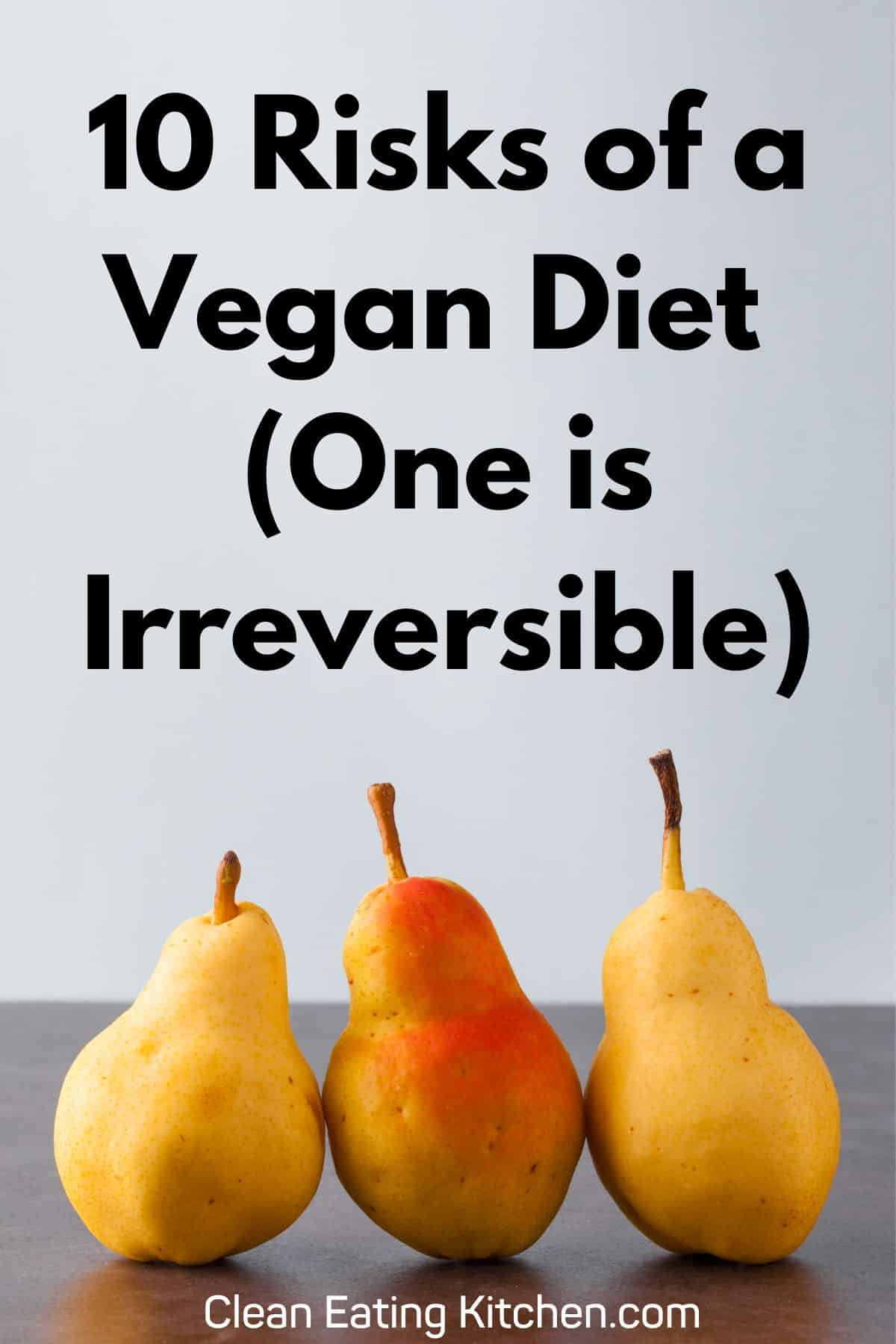
Have you ever wondered if a vegan or plant-based diet would help you manage your weight and resolve any nagging health problems? That’s the promise that is often made around this trend.
But, you hear less about the health problems that can occur from a strict plant-based diet that excludes all animal products. This article includes ten reasons that may dispel the myth that veganism is the healthiest diet and works for everyone.
I’ve also included some suggestions for how to counter these potential health risks of a vegan diet.
What Is a Vegan Diet?
What is a vegan diet? Simple put, a vegan diet is one that excludes any food that comes from an animal. This includes eggs, dairy, meat, fish, poultry, and even honey.
Some people take a vegan diet even further and embrace it as a lifestyle, and will not purchase or use any clothing or personal care products that include animal-based ingredients.
Whole foods, plant-based diets
A “whole foods, plant-based diet” is more often the term used for an approach that includes fewer processed foods, and a greater emphasis on fruits, vegetables, legumes, grains, nuts, and seeds.
However, even that term can get confusing as paleo diets are considered to be a plant-based approach, but they do include animal products.
Learn more about the differences between clean eating, paleo, vegan, keto, and Whole30 diets or the differences between vegan and vegetarians.

What vegans eat
If a vegan or plant-based diet does not include any animal products, then what does it include?
Vegans can eat vegetables, fruits, whole grains, soy, legumes (beans), nuts, and seeds.
A vegan diet doesn’t necessarily means it’s healthy, though, since it by definition does not exclude a lot of processed foods, sugar, or gluten.
Just look at the popularity of fake meats which are incredibly processed and not necessarily healthy by any stretch of the imagination. See my related article on the potential dangers of plant-based meats.
The healthiest vegan diet is likely a plant-based diet that also is one of the best diets for climate change.
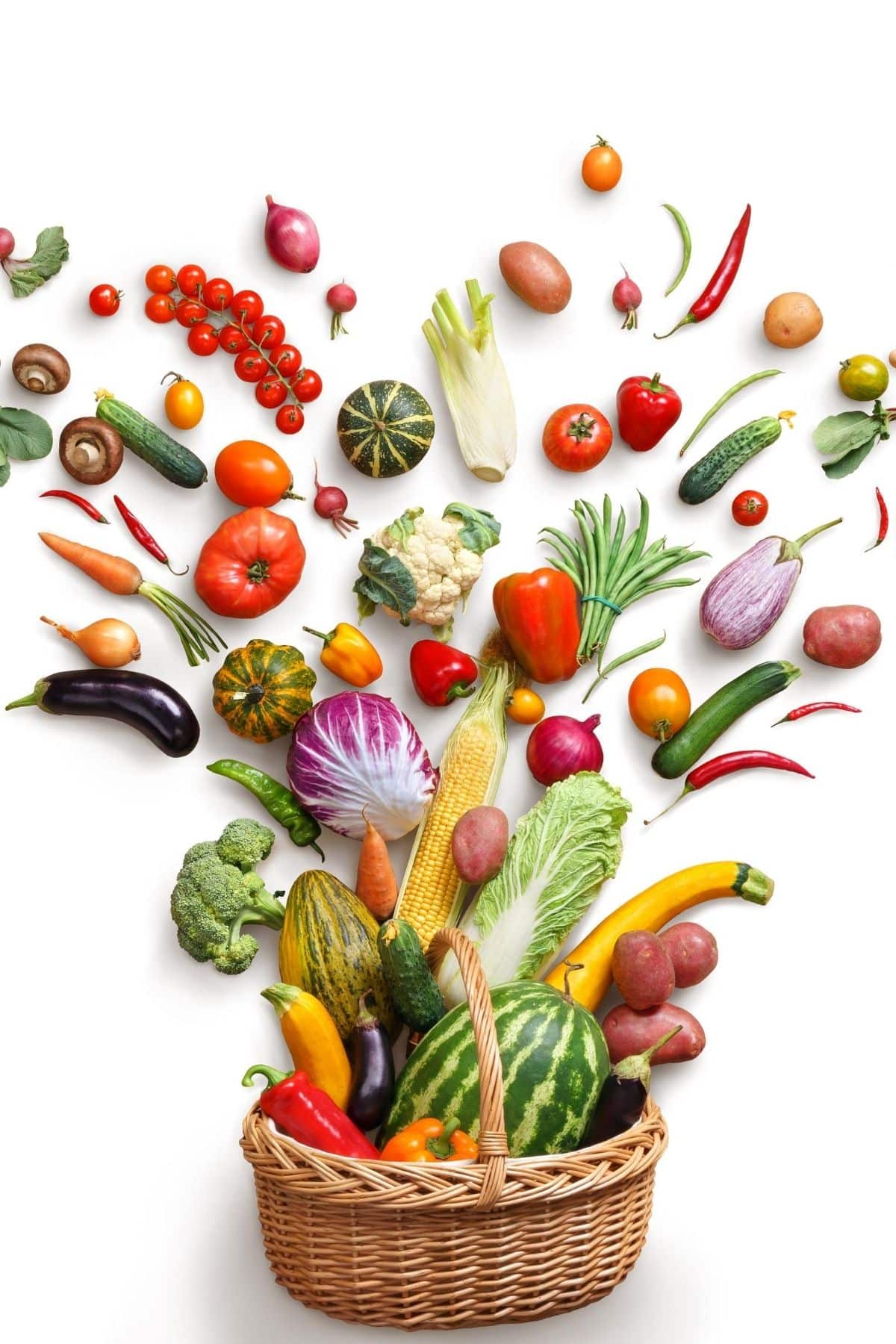
A vegan diet is an extreme diet
Although some people may thrive on a vegan or plant-based diet, it should be noted that it is considered an extreme diet because of how many foods it excludes, as well as the potential for nutritional deficiencies.
This article includes ten real problems with a plant-based diet, including my experience as a woman whose health declined as a result of being on a strict vegan diet.
If you are 100% committed to eating a vegan diet but you are always feeling tired, you might also want to read my article with tips for how to reverse fatigue on a vegan diet.
This article includes links to scientific studies whenever possible.
However, some of these potential diet dangers are anecdotal and not based on human studies. So, as always, it’s important that you consult your healthcare provider to help determine what type of diet is best for you.
Ten Potential Vegan Diet Dangers
Please note, my intent with this article is not to discredit any of the benefits that can result from eating more plant foods, but to provide cautionary evidence of what can happen if a vegan diet is taken too far and warning signs are ignored.
1. Risk of anemia due to a lack of heme iron
Iron-deficient anemia is the most common nutritional deficiency in the world, and both vegans and vegetarians are at higher risk of this condition.
While plant foods contain a form of iron, it is called non-heme iron and it is much less absorbable by the body.
Iron-deficient anemia can lead to serious symptoms including fatigue, and women of child-bearing age should be aware of how a vegan or vegetarian diet can quickly lead to anemia.
See my related post on how to eat to support your menstrual cycle.
While iron supplements can be taken to help reverse or prevent anemia, most women dislike taking iron supplements because potential negative side effects including constipation. It can also be difficult to take enough iron supplements to overcome anemia, especially without eating animal sources of iron.
See my list of the best vitamins for women over 30 or the best vitamins for a teenage girl which include iron to help boost ferritin levels.
You may also want to consider adding cricket protein to your diet. While eating insects is not normally accepted in a vegan diet, it may be a lower-impact way of adding animal protein back into your diet without eating animals like cows, fish, or chicken.
Having your ferritin levels checked regularly if you are a woman of child-bearing age is essential to ensure you don’t become anemic on a plant-based diet. See my article on how to order lab tests without a doctor.
You may also want to consider cooking with a cast iron pan (see my list of the safest cookware material).
Eating therapeutic meat
If you cannot raise your iron levels on a plant-based diet and you are at your wits end, you may consider something called eating “therapeutic meat.” The idea is that you eat just enough meat to raise your iron levels and then go back to a non-meat lifestyle.
This is a practice that is becoming more popular and may be something to consider. It is similar to getting a religious exception to eat certain foods not usually allowed in that religion unless you are sick or elderly.

2. Increased risk of depression with low omega-3 fatty acid intake
Without a food source of omega-3 fatty acids from fish or fish oils and an increased consumption of omega-6 fatty acid from foods like nuts, vegans might be at higher risk from depression.
Algae-based sources of omega-3 fatty acids are an option, but they can be expensive and hard to find. And, since many vegan diets may include a higher than average intake of nuts, the balance of fatty acids in the body can still get off-balance.
There are issues associated with low omega-3 levels and some are quite serious. Pregnant women also need to be extremely aware of their omega-3 intake as the fatty acids help nourish the fetal brain development.
Omega-3 fatty acids can be tested through a blood test, and should be monitored if you start experiencing symptoms of depression or anxiety. Please do contact a healthcare professional as soon as you think you might be depressed, as you don’t want the symptoms to get worse.
Once you have your levels tested, you can use algae-based omega-3 supplements to help increase your levels. In the worst case scenarios, you can consider taking a fish oil supplement to get your levels stabilized.
You may also want to consider the best magnesium supplements to help with anxiety.

3. Risk of Vitamin B12 deficiency
Since vitamin B12 is only available in animal foods, vegans are at a much higher risk of developing a deficiency in this vital nutrient.
In fact, most nutrition professionals agree that those on a vegan or vegetarian diet must supplement with a high-quality vitamin B12 supplement to avoid irreversible health conditions that can result from deficiency.
It should also be noted that many people have a genetic variation known as MTHFR that can impact how B vitamins are absorbed. In this case, even certain B vitamin supplementation might not be enough to prevent a deficiency.
Read more about the best MTHFR diet and supplements.
If you are at all concerned that you aren’t getting enough vitamin B12 in your diet, then ask your doctor for a vitamin B12 test.
If it turns out you are low in vitamin B12, then you may need to get an injection or use sublingual supplements, plus have your levels monitored regularly.
You may also need to monitor your intake of vitamin B2 (riboflavin) and vitamin B3 (niacin), as these can also be lower on a vegan diet.

4. Inhibition of zinc absorption on vegan and vegetarian diets
Similarly to deficiencies that can occur with vitamin B12, vegan and vegetarian diets can result in low zinc status.
It is theorized that the problem in this case is that higher consumption of plant foods containing phytic acid may inhibit the ability of the body to absorb zinc.
Because of this potential issue with zinc absorption, it is often recommended by nutrition professionals that vegans and vegetarians should increase their intake of zinc up to 50% of the recommended daily allowance to ensure adequate levels.
Good zinc levels are really important for boosting the immune system so it’s important to make sure you’re eating enough food sources of zinc or that you take a zinc supplement.
Plant-based sources of zinc are not as bioavailable as animal sources, so make sure you are getting enough from food sources or from supplements. Be careful with zinc, though, as you don’t want to take too much.

5. Low intake of iodine
Without quality sources of seafood, there is a real risk of not getting enough iodine in both vegan and vegetarian diets.
Iodine deficiency is problematic and can lead to hypothyroidism and other complications.
Vegans and vegetarians can supplement with iodine by using iodized salt or eating seaweed products. But, deficiencies still persist.
6. Not consuming enough calcium
Another nutrient deficiency that can occur with dairy-free, vegan, and plant-based diets is calcium deficiency.
While you can get calcium from plant-based foods, there is generally less calcium than in dairy products. And, plant foods often contain phytates and oxalates than inhibit the absorption of calcium.
A long-term risk of inadequate calcium intake is an increased risk of bone fractures.
If you cannot or do not want to consume dairy products, be sure you are taking a calcium supplement or consuming fortified plant-based milks.
7. Risk of consuming too much carbohydrate
Vegan diets are generally lower in protein and can cause blood sugar swings in certain individuals. There is also the risk of over-consuming carbohydrates on a vegan diet, especially since legumes are often consumed as a protein source, but are very high in carbohydrates.
Vegans may also replace the calories from protein sources with refined carbohydrates including bread, crackers, and cookies.
Over-consuming carbohydrates can lead to non-alchoholic fatty liver disease, blood sugar disregulation, and other troublesome symptoms. See my articles on how to follow a sugar-free diet and how to do a sugar detox.
You may also need to consider eating more complex carbohydrates like sweet potatoes as opposed to eating simple carbohydrates like crackers or bread.
You may also want to check out this article on the best gluten-free carbohydrates if you are unsure about which ones you should be eating.
8. Not eating enough high-quality protein
Eating a diet that includes moderate to higher levels of protein has been shown to have a positive effect on satiety and weight management. It can be harder to find quality sources of protein on a vegan diet that aren’t also carbohydrate sources (like beans) or are soy-based.
Without a quality source of lean protein in the diet, vegans may experience fatigue or low exercise tolerance. If that is the case, you may need to consider adding protein powder to your diet.
See my list of the best clean protein powders.
One risk of not eating enough protein is sarcopenia, or muscle wasting. This may be particularly true for older adults who are on vegan diets.
9. Risk of disordered eating
Orthorexia is a type of eating disorder that is defined by an over-fixation on healthy eating patterns. It can result in over-restriction, obsession, and other serious eating disorders.
At least one study found that vegans and vegetarians tended to display more orthorexic eating patterns, and most eating disorder specialists do not recommend restrictive diets such as veganism or vegetarianism for people trying to recover from an eating disorder such as orthorexia.
Read more about orthorexia and food obsession.
If you find that your eating disorder is getting worse on a vegan or plant-based diet, then you should consider working with a qualified therapist to help work on increasing your body weight.
In the worst case scenario, your therapist may advise you to consider moving away from a vegan diet while you repair your relationship with food.
You may also need to consider eating more calorie-dense foods if you are recovering from an eating disorder. See my 1,000 Calorie Weight Gain Smoothie or my list of the best Weight Gain Smoothies for recipe inspiration.

10. Processed soy issues
Again, as a result of excluding all forms of animal protein, many vegans turn to soy as a protein source.
While unprocessed forms of soy may be okay for some people, processed forms of soy are commonly found in a vegan diet, including tofu, soy milk, and soy-based processed foods sold as meat substitutes.
Processed soy foods are no better for human health than any other highly-processed foods, but with the added risk of hormone interference due to phytoestrogens found in all forms of soy.
Soy has also been found to be a contributor to the intake of the toxic metal cadmium in vegans and vegetarians.
Read more about the potential dangers of eating soy.
To help counteract or avoid any negative results from eating too much soy, you may consider eating fermented soy sources such as tempeh, or limiting your soy consumption to several times a week. You may also wish to avoid non-organic forms of soy which can be a source of GMOs in the diet.
If you do choose to consume soy, try making healthy recipe as opposed to buying processed versions. I recommend my Air Fryer Tofu as a great option.

Additional health risks associated with veganism
While some of the health risks of a vegan diet are outlined above, this list is not complete.
There are other risks of a plant-based diet including becoming isolated from friends and family due to an extremely restricted diet, the risk of eating too many high histamine foods and developing histamine intolerance, the risk of triggering a gluten intolerance when consuming too many gluten-containing foods, and other risks including inadequate intake of vitamin D.
The bottom line is that a vegan diet is not natural for humans and most cannot stick with it (up to 84% of vegans and vegetarians end up eating meat again).
While it can be used on a short-term basis for weight loss or for other health reasons, it may result in significant nutritional deficiencies over the long term as well as other risks including eating disorders and isolation.
This is especially true if a vegan is not taking supplements and is not being closely monitored by a healthcare professional with regular blood work.
Signs of an Unhealthy Vegan Diet
An unhealthy vegan diet, like any poorly planned diet, can lead to various nutritional deficiencies and health issues such as the ones mentioned above.
Still, you may not know if your vegan diet is letting you down until you start experiencing symptoms or signs of deficiency. Here are some signs that a vegan might not be getting a balanced diet:
- Fatigue and Weakness: This can be a sign of iron deficiency anemia, common in those not consuming enough iron-rich plant foods or vitamin C, which enhances iron absorption.
- Poor Skin Health: Dry, pale, or bruised skin might indicate deficiencies in vitamins and minerals like vitamin A, vitamin C, and zinc.
- Hair Loss and Brittle Nails: This can result from inadequate protein intake or deficiencies in vitamins and minerals like iron, zinc, and vitamin B12.
- Dental Issues: Problems like bleeding gums can be a sign of vitamin C deficiency, while weak enamel might indicate a lack of vitamin D.
- Digestive Problems: Persistent digestive issues may be due to a lack of dietary fiber, often found in fruits, vegetables, and whole grains, or from overconsumption of processed vegan foods low in fiber.
- Mood Changes and Cognitive Problems: Deficiencies in omega-3 fatty acids, vitamin B12, and iron can affect mental health, leading to issues like depression, anxiety, or difficulty concentrating.
- Frequent Illnesses or Slow Healing: This might indicate a weak immune system, possibly due to deficiencies in essential nutrients like zinc, vitamin C, and vitamin D.
- Unintended Weight Changes: Sudden weight loss might result from not consuming enough calories, while weight gain might occur from over-reliance on processed vegan foods high in sugar and fat.
- Bone or Joint Pain: This could indicate a deficiency in vitamin D or calcium, both crucial for bone health.
- Irregular Menstrual Cycles in Women: This can be caused by low body weight, high physical stress, or insufficient intake of essential fats and other nutrients.
It’s important to note that these symptoms can be caused by a variety of factors and may not necessarily be due to diet alone. A well-planned vegan diet can be healthy and nutritious, but it requires careful planning to ensure all nutritional needs are met.
I highly recommend consulting with a functional medicine practitioner who can help do the necessary lab testing and analysis to figure out the individualized diet appropriate for your needs.
My Experience
Most of you know me as creator of the Clean Eating Kitchen website.
I have a master’s degree in public health with a specialty in nutrition, but I’m also a woman on a healing journey, looking to find more natural and holistic ways to feel better and recover from health issues resulting from decades of eating a Standard America Diet (you can read more about me).
My introduction to veganism
Back in 2010, I had a friend who had gone on a vegan diet because she no longer wanted to eat animals (usually referred to as an ethical vegan). This was my first exposure to a vegan diet.
I then saw Oprah interview Alicia Silverstone about her book The Kind Diet and was even more curious about the purported health benefits of going vegan.
I got a copy of the book and was smitten with the idea that cutting out animal foods could potentially fix all the health problems that I was having, especially the inability to manage my weight that I learned years later was a result of undiagnosed thyroid disease.
My experience being vegan and then moving away from veganism
The first year on a vegan diet was okay. I had a hard time giving up some of my favorite foods, especially dairy yogurt and eggs. I didn’t lose any weight going vegan, but I had reduced acne outbreaks once I stopped eating dairy (I am still dairy-free).
About one year into my vegan diet experiment, I started experiencing an outbreak of hives after eating. The hives were intense. One morning my eyelid was swollen shut. I thought perhaps gluten might be the issue, so I also then cut out gluten (I am also still gluten-free).
Around that time, I also came across a more extreme version of veganism, one that cuts out all oils, processed foods, refined carbs, and sugar. I thought maybe, just maybe, that I had found the answer to losing weight and feeling good.
One thing led to another and I was eventually diagnosed with severe Hashimoto’s disease and then thyroid cancer in 2012. My world came crashing down. At the time, I had been following this extreme form of veganism for almost two years and thought I was supposed to be protected from such a terrible diagnosis.
I continued on the vegan path even after my diagnosis and treatment, thinking if I just tried harder or got more restrictive, then I would be healthy. My diet got more and more restricted and I felt an eating disorder mindset start to consume me. I was always hungry, yet I wouldn’t allow myself to eat the foods that would nourish and heal me.
Finally, after careful thought and lots of fretting, I decided to stop being vegan. I wrote a blog post about not being vegan anymore and lost a lot of friends over my decision (that blog post has over 500 comments on it).
Once I was immersed into the vegan culture, it made it that much more difficult to mentally make that mental shift of eating meat again. I experienced bullying and shaming when I wrote publicly about my decision.
Ultimately, I consulted with a dietitian, an eating disorder specialist, and functional medicine practitioners to recover my health and a balanced relationship with food.
At this point, I now have a much more balanced relationship with food, and I follow a clean eating diet full of real, whole foods. I eat a mostly gluten-free, dairy-free diet to manage my autoimmune conditions. I consume animal products, although I am very careful to try and choose wild, pasture-raised, organic, and local options whenever possible.
Overall, my energy levels are much more consistent and I don’t have the blood sugar swings that I had while I was eating a plant-based diet. My lab work shows that I have much higher levels of iron than I had while I was vegan, and overall I feel so much better.
FAQs About Vegan Health Risks
There are risks of nutritional deficiencies, as well as a risk of exacerbating or initiation of disordered eating patterns. Please contact your healthcare provider to determine which is the best diet plan for you, and how you may adapt a plant-based diet to best meet your individual needs.
There are certainly healthy aspects of a vegan or plant-based diet, as long as you are aware of the potential risks. And, as with any diet plan, if you determine it is not meeting your needs, you have the right to change your mind.
It all depends on the individual. But, there are enough significant risks on a vegan diet that you may want to consult with your healthcare provider to determine which diet is best for you.
It is also worth noting that you are allowed to try a vegan diet and you are also allowed to not eat a vegan diet. Your health and well-being is more important than sticking to a set of rules created by someone else.
Problems with a plant-based diet are similar or the same as the problems with a vegan diet. The bottom line is that both vegan and plant-based diets are very restrictive and may create problems over time, including nutrient deficiencies and restricted eating patterns.
Conclusions
Certainly, not everyone has a negative experience on a vegan diet.
There are plenty of people who would benefit great from adopting certain aspects of veganism, including incorporating more vegetables into the diet, and understanding the importance of not purchasing or consuming factory-raised meat.
See my clean eating food list for inspiration and a guide. You might also like this article on the best multivitamin for a women in 30s.
I eat a lot of vegan foods and still create a lot of vegan recipes, especially since I’m gluten-free and dairy-free to manage my autoimmune-related inflammation. I try to eat a variety of plant foods, while including animal protein with most of my meals.
The bottom line is that it’s important to be aware of the risks of extreme diets and any quick-fix approach to health. Based on my experience and exposure to the scientific literature on nutrition, a balanced diet including varying ratios of all of the macronutrients, will most often provide long-term benefits and a reduction of risk of nutritional deficiencies.
Please feel free to leave thoughtful comments that add to the conversation. If you’re looking to bash me for my dietary choices, then don’t waste your time. See my comment policy if you don’t see your comment published.
If you are upset about the plight of factory farm animals, then know that I am concerned about that as well. If you have ideas about how to educate the general public about choosing better sources of food, then I would be very curious to know how we can do that together.
Read Next: Tips on How to Reintroduce Meat After Being Vegan or Vegetarian
More Articles About Veganism & Diet You Might Like
References
- James H. O’Keefe, Evan L. O’Keefe, Carl J. Lavie, Loren Cordain, Debunking the vegan myth: The case for a plant-forward omnivorous whole-foods diet, Progress in Cardiovascular Diseases, Volume 74, 2022, Pages 2-8. https://www.sciencedirect.com/science/article/abs/pii/S0033062022000834
- Freed DLJ. Do dietary lectins cause disease? : The evidence is suggestive—and raises interesting possibilities for treatment. BMJ : British Medical Journal. 1999;318(7190):1023-1024 https://www.ncbi.nlm.nih.gov/pmc/articles/PMC1115436/
- Rizzo G, Baroni L. Soy, Soy Foods and Their Role in Vegetarian Diets. Nutrients. 2018;10(1):43. doi:10.3390/nu10010043. https://www.ncbi.nlm.nih.gov/pmc/articles/PMC5793271/
- Hibbeln JR, Northstone K, Evans J, Golding J. Vegetarian diets and depressive symptoms among men. J Affect Disord. 2018 Jan 1;225:13-17. doi: 10.1016/j.jad.2017.07.051. Epub 2017 Jul 28. PubMed PMID: 28777971. https://www.sciencedirect.com/science/article/pii/S0165032716323916
- Pawlak R, Parrott SJ, Raj S, Cullum-Dugan D, Lucus D. How prevalent is vitamin B(12) deficiency among vegetarians? Nutr Rev. 2013 Feb;71(2):110-7. doi: 10.1111/nure.12001. Epub 2013 Jan 2. Review. PubMed PMID: 23356638. https://www.ncbi.nlm.nih.gov/pubmed/23356638/
- Foster M, Chu A, Petocz P, Samman S. Effect of vegetarian diets on zinc status: a systematic review and meta-analysis of studies in humans. J Sci Food Agric. 2013 Aug 15;93(10):2362-71. doi: 10.1002/jsfa.6179. Epub 2013 May 29. Review. PubMed PMID: 23595983. https://www.ncbi.nlm.nih.gov/pubmed/23595983
- Westerterp-Plantenga MS, Lemmens SG, Westerterp KR. Dietary protein – its role in satiety, energetics, weight loss and health. Br J Nutr. 2012 Aug;108 Suppl 2:S105-12. doi: 10.1017/S0007114512002589. Review. PubMed PMID: 23107521. https://www.ncbi.nlm.nih.gov/pubmed/23107521
- Barthels F, Meyer F, Pietrowsky R. Orthorexic and restrained eating behaviour in vegans, vegetarians, and individuals on a diet. Eat Weight Disord. 2018 Apr;23(2):159-166. doi: 10.1007/s40519-018-0479-0. Epub 2018 Feb 3. PubMed PMID: 29397564. https://www.ncbi.nlm.nih.gov/pubmed/29397564.
- Dagnelie PC. [Nutrition and health–potential health benefits and risks of vegetarianism and limited consumption of meat in the Netherlands]. Ned Tijdschr Geneeskd. 2003 Jul 5;147(27):1308-13. Review. Dutch. PubMed PMID: 12868158. https://www.ncbi.nlm.nih.gov/pubmed/12868158
- Key TJ, Appleby PN, Rosell MS. Health effects of vegetarian and vegan diets. Proc Nutr Soc. 2006 Feb;65(1):35-41. Review. PubMed PMID: 16441942.
- Simpson JL, Bailey LB, Pietrzik K, Shane B, Holzgreve W. Micronutrients and women of reproductive potential: required dietary intake and consequences of dietary deficiency or excess. Part I–Folate, Vitamin B12, Vitamin B6. J Matern Fetal Neonatal Med. 2010 Dec;23(12):1323-43. doi: 10.3109/14767051003678234. Epub 2010 Apr 7. Review. PubMed PMID: 20373888. https://www.tandfonline.com/doi/abs/10.3109/14767051003678234?journalCode=ijmf20
Don’t forget to join my newsletter list to get exclusive clean eating recipes and tips. The newsletter is 100% free with no spam; unsubscribe anytime.
About the Author: Carrie Forrest has a master’s degree in public health with a specialty in nutrition and is studying to be a holistic nutritionist. She is a top wellness and food blogger with over 5 million annual visitors to her site. Carrie has an incredible story of recovery from chronic illness and is passionate about helping other women transform their health. Send her a message through her contact form.
Note: this post is for informational purposes only and is not intended as medical advice. Please consult your healthcare provider for recommendations related to your individual situation.



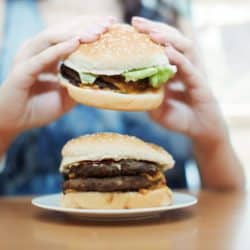
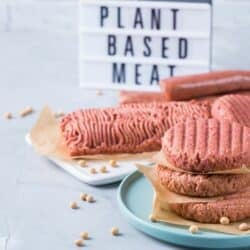











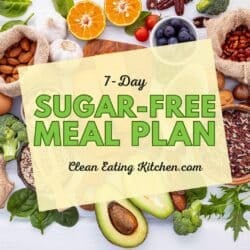




Hello Carrie,
I have just found this interesting article. I am not a vegan and never was. I have 19 years old daughter, her boyfriend is vegan, commenting on what she eats, telling her to watch what she is eating. When she is with him she eats only what he ‘approves’. She has been manipulated by him. She leaves in UNI accommodation no at home and will be for next 2 years. She used to eat properly I have to say that we as whole family (4 of us) always been eating fruit, veg, eggs, dairy products, pulses and meat, not as much fish as we should I suppose but generally healthy.
Recently watching her I have spotted that she is most of the time tired, has no energy, she is short of breath when exercising, her urine smells ( sorry but want to be honest and open) she is very moody and her period cycle is upside down. I do tell her that she has to stay herself not to do what her boyfriend tells her to do but she doesn’t listen. I do worry that she will get ill from following ‘vegan diet’.
I don’t agree with vegan people to try and persuade others that what they do is the best and heathier. I would like to take her to see specialist but she refuses to go. I would like to know your opinion.
Hi Silvia, thanks for reaching out. I think this is really distressing. I don’t have an expert opinion since I’m not an expert in this field. But, maybe there is as aspect of your daughter’s health that you could focus on and try to improve. For instance, if her menstrual cycle is messed up, then maybe you two could research together how to get it back on track. There is a great book called The Period Repair Manual by Dr. Lara Briden that talks about how important it is to have balanced hormones for overall health. She also talks about diet and how important it is to get certain nutrients. So, perhaps by default your daughter might learn more about nutrition as she is trying to fix her cycle? Other than that, maybe she would consider seeing a vegan or plant-based dietitian or nutritionist who could at least help her get on a more balanced vegan diet and try to resolve some of her health issues. Does that help at all? I’m sure you are very concerned, but you don’t want to alienate her by telling her what to do.
I love this soooo much. Growing up whenever I would eat more of certain foods, I would turn orange. As in bright, Trump orange. As a kid I called it “carrot jaundice”. Fast forward to adulthood, failed vegan attempts and a genetic test later. Turns out I have not one but two gene mutations that inhibits my body’s ability to convert beta carotene into retinoids (Vitamin A). So I literally had “carrot jaundice”. The beta carotene was just siting in my body doing pretty much nothing. It also means that I must have animal sources of vitamin A. Unfortunately every vegan I’ve met either says I didn’t try hard enough (umm can’t exactly WILL my body to do what it genetically can’t) or I’m lying. Why would I lie? I grew up on a farm and LOVE veggies., are veggies straight from our garden. Unfortunately certain veggies don’t love me.
Thanks for sharing that, Jessica! I wish more vegans knew about these conversion and absorption problems, and acknowledged that everyone is different!
thank you for this balanced and rational approach that the vegan world was missing out 🙂
Hi Carrie,
My name is Natalie. I too have had a long journey of finding what foods made me feel the best. I was diagnosed a few years ago with PCOS and by switching to a whole30 diet I was able to conceive my daughter. While being pregnant and post baby breast feeding, I found that I needed more carbs. I allowed myself to have more complex carbs and still stayed away from processed foods. This past October I switched to being plant based without entirely giving up eggs and also not eating soy products due to my infertility issues. I have always had clear skin and have worked out 6/7 says a week.Around November I started to experience hive like allergic reactions on my face only…. they have come and gone over the last few months and I still can’t figure out why…. I wanted to write you after reading your blog since you also experienced hives. I am wondering if this has anything to do with switching to plant based. It makes me wonder if my body just needs some meat, organic and grass fed meats? Eggs? Just wondering your thoughts and your experiences.
Hi Natalie, I’m sorry to hear that you’re having hives. You would have to work with a functional medicine practitioner to do the testing to see what nutrients you might be deficient in. I can tell you that my hives didn’t go away until I started taking a high dose probiotic and got my leaky gut under control. I think my leaky gut symptoms were exacerbated by eating so many beans when I was vegan.
Thanks for sharing this! I went vegan for two years, while breastfeeding after buying into a book… the China Study. I was under the impression that dioxins that are stored in high amounts in animal product would eventually give me cancer… I see now that I was cherry picking, and not looking at the full picture. Anyway, I wanted to share for anyone who is vegan, and thinking it is a good idea to raise a child vegan like I did… it’s not a good idea! I ate so many anti-nutrients, and no fat, and my teeth (and probably bones) took the brunt of this decision, as well as my three year old boys dental health. We each developed cavities, and his are so bad, pretty much his entire top row of teeth have holes, and one tooth is so decayed there’s only a little stub left of it. I’m terribly regretful, and just wanted to share my experience so hopefully someone can benefit from it. I now eat mainly meat, and fat. Pastured, grass-fed. I take liver supplements, and cod liver oil. I have even noticed a hardening of my black cavitities. My son’s tooth decay has at least been halted, i just wish i had known sooner. Thanks for reading.
Thanks for sharing that, Bethany. I also have regrets about the harm to my health and my husband’s health that occurred from a vegan diet. But, I’m so glad to be wiser now. I’m glad you are doing better, and your little guy too.
Hi thanks for the article. I was a veggie all my life. For 30 years veggie and 7 years vegan due to IbS intolerances I had to give up gluten, dairy and refined sugar.so I started to have severe iron deficiency, dangerously low vit D. I kept going on my veggi diet having yogurt as the only animal product. I too like you had hives. Allergies to gluten, dairy, sugar, and hair dye and much more all of a sudden come about. I have had weight issues all my life. I ate the most healthiest diet from planet organic and couldn’t loose weight. I did many cleanses and detox’s. Nothing helped. I had the worst swelling you can think of. Every other day I had an allergy attack from tomatoes, fruits…Anyway so I did a hair test and gut test few months ago. Both advised me to eat high proteins like chicken and eggs. No carbs or fats. Started this diet 6 months ago and finally started loosing weight. Iron and vit D in range. Less tired. More energy. I still eat Lots of vegetables but added fish and chicken. My hives have calmed down too. I’m also taking billions of probiotics daily to heal my guts. In conclusion I would love to be vegan all my life. I love the energy I get from veggies. Tastes yum too so much better than meat but to heal my body and help balance my body I have to eat eggs and chicken. I feel more energetic after eating chicken. Being completely vegan or veggi has not aided my survival in the long run. I lacked way too much nutrients and was tired all the time even if I ate beans pulses and Vegetables all day. I kept putting on weight. I don’t feel being veggie or vegan has helped my body. I think it caused problems for me.
Thank you for sharing your experience. I am so glad you are doing better. I have to agree that being vegan cause more health problems for me than benefits. But, it left me with a deep regard for how animals are raised and gratitude for their nourishment.
thank you for speaking out. it requires a lot of courage in a community where people may not be very forgiving or understanding. that seems almost par for the course these days when diets can be so deeply personal.
i tried a low fat plant based diet this year and did not fare well. i was eating about 15% fat which is what the plant doctors recommend for those with blood sugar issues (i’m prediabetic). i ended up on a horrible hypoglycemia roller coaster for 2 weeks, i almost couldn’t function sometimes. i increased my fat intake, but encountered other problems. most groups i joined online are strictly against oil. i found myself starting to fear oil and feel a little eating disordered. i was also tired of feeling like every day there were less foods i was allowed to eat. i got sick of beans. i hated that eating out brought on trepidation. i dropped a bunch of weight, which was nice, but i think it was just muscle and water. i never felt right about my protein being so much lower than i was used to all my life, and could never find a straight answer about that in my research; i just knew it wasn’t comfortable. i hit my limit when i began to have intense cravings for meat. it was so bad i ran straight to the store and bought a big deli sandwich. i went to a dietitian who told me that she tried going 100% plant based once and became anemic. i thought if this happened to my dietitian what could i end up doing to myself? i couldn’t ask this on an online group, where i also grew tired of the extremism and cult-like mindset (sorry, i am not describing everyone of course). there was just no middle ground and everyone who ate meat was the enemy.
what’s funny is that a few months later, my doctor actually prescribed me to eat meat, fish, eggs, etc. i am having hypoglycemia again and was told to eat plenty of protein. i would be in a horrible position right now if i refused to stop my vegan diet. i ate some red meat last night and i felt so good, and my blood sugar is improving and i feel better. mentally i’m relieved i am not so restricted anymore either.
always do what is right for your health. i am glad you are doing better these days. again, thanks for talking about this. who knows what will happen down the road. “the game changers” has really inspired a lot of people to eat plant based. i hope they do their homework and eat as healthy as possible. i wonder how many will stick with it.
Thank you for sharing your experience and I am SO glad you escaped the cult mindset and listened to what your body was telling you. I agree, it’s scary that so many people think that plant-based diets are for everyone but our bodies did not evolve to eat that way. I’m so happy you are doing better now.
Thank you so much for this balanced article. I agree that a balanced diet incorporating everything is the best approach. Extremes of anything never works.
I so agre. Thanks, Debbie!
Carrie, I’ve followed you for a while but this is the first time I’ve commented. I wanted to let you know how much your sharing your experiences with veganism correlating with worse health for you has helped me validate my own experience. I read a lot about nutrition and, in my fear of developing cancer/disease, I had slowly become 85% vegan / 15% vegetarian. I didn’t label myself as either, but that’s how I ate. I was really focused on being “healthy” and drank the kool-aid from other sources that promote entirely plant based diets. Yet, I felt bloated (not just GI issues although, yes, those waaaay worsened) – like bloated in my whole body, like not myself. I’ve always been prone to blood sugar instability, and my blood sugar often felt high. I had so many night sweats that I’d have to change my pajamas 2-3 times per night. People in the vegan community told me my body was just “detoxing” and I should just stick it out. Internally, I really began to wonder: my intuition based on how my body feels says eating animal sources feels better for me. However, the research I had been exposed to said otherwise. I wondered if perhaps I should suffer how I felt in intuitively in order to keep eating what my mind said was healthier. Fast forward to seeing that my blood sugar was nearing pre-diabetes level on an almost exclusively WFPB diet with basically no processed foods and minimal oils. I was eating exactly how all the health-promoting things I was reading said to eat. But when I saw that blood test, I changed course. I continued to eat many vegetables, but I toned down my fruit consumption (I still eat fruit most days but not like before), incorporated wild fish, pasture-rasied eggs, pasture-raised meat, and was a little more cautious about how many carbs were in each meal. And literally essentially over night (well, I honestly think it only took two days), my body didn’t feel bloated anymore, my night sweats entirely stopped, I felt more “grounded” (read: blood sugar was stabilized). So now I know that this is how I feel best and what is healthiest for my particular body. I am a little bummed that what is best for my health is not what is best for animal rights and the planet, but I cannot sacrifice my health. And I wanted to say thank you for being public about your experience, because when I google “veganism not healthy for me” or something like that to try to find if I’m the only one, I honestly don’t get much. You are one of the few narratives out there who validates my experience, which helps me trust my own inner wisdom. My experience has made me whole heartedly believe that the healthiest diet for one person is not the same for another person. We are all individual and the only way we can know how to eat is by being in tune with ourselves and keeping an open mind. For many, that probably is a WFPB and for many that’s probably not. I do believe there is no one who benefits from highly processed foods (so at least there are some things we can know are universally true, which makes decision making easier).
As an add on, another commenter mentioned that O blood types need higher protein, and I do have an O blood type. I had not heard this before, but this is interesting to me.
Thanks for sharing your experience, Laura. I am SO happy that you are doing better. I wish there was more of a discussion in the public about how to move away from factory farming and less about whether you’re a good or bad person for being vegan or not. I’m so happy you left this comment and I hope others benefit from it as well. XO.
Thanks, Carrie!
Great article,
My husband and I became vegan for a year for the environment and ethical reasons. Unfortunately, I became extremely anemic and vit B deficit to the point where I had to have iron infusions and vit B shots. I also put on 30lbs. Additionally, I subsequently found out that I am allergic to corn, wheat, quinoa and seeds.
Anyway, I now cook for myself and back to being healthy. Salads, veggies, fruit and a small amount of meat and fish. Being vegan taught me to choose what I eat wisely, and to be frugal and thoughtful about what you put in your mouth. Especially in the west people are looking for a way to be able to eat to excess, so if that pizza is vegan, or that beyond burger has some ethical, albeit misguided, narrative behind it, there is another green light to chomp away on processed food.
Overall, I personally feel that the best thing for the planet and for your health is to eat organic food. It is the overconsumption and affordability of fast food that is the issue. Nobody needs to eat large amounts of processed meat, or ‘vegan’ food. Also, no one should be in a position where fast food is all they can afford.